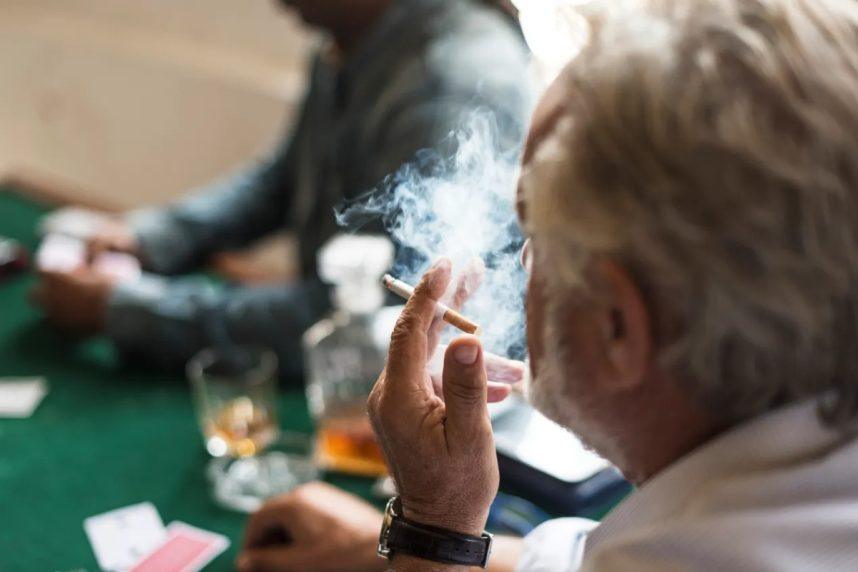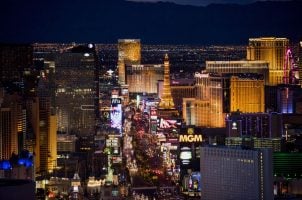Casino Investors Taking Hardline Against Smoking
Posted on: June 12, 2024, 12:46h.
Last updated on: June 12, 2024, 01:21h.
More major investors are pressing publicly traded casino operators to move to smoke-free environments, and the 2024 proxy is evidence of those elevated efforts.

This proxy season has seen efforts by large shareholders of Bally’s (NYSE: BALY), Boyd Gaming (NYSE: BYD), and Caesars Entertainment (NASDAQ: CZR) to consider smoke-free proposals. As reported by Bloomberg Law, the pitch brought by Bally’s investors garnered support of 11.6% at the regional casino operator’s annual meeting in May while that percentage nearly doubled to 22.5% among Boyd investors.
On Tuesday, a majority of Caesars investors defeated a proposal by other shareholders that demanded a report on the potential cost benefits of the gaming company transitioning to all smoke-free properties. While the aforementioned anti-smoking proposals were turned down by the majority of investors in the gaming companies, the percentages of supporting votes at Bally’s and Boyd are noteworthy because they’re high enough for shareholders to submit similar plans again in 2025. As of Tuesday, Caesars hadn’t disclosed the percentages of the anti-smoking vote.
“Proposals that receive 5% or more of a shareholder vote can be resubmitted the following year. The threshold goes up to 15% on their second year on the company ballot, and 25% for the third year,” reports Clara Hudson for Bloomberg Law.
Combined, Bally’s, Boyd, and Caesars run more than 70 gaming venues across the US. By number of properties, Caesars is the largest casino operator in the country. Caesars noted in its most recent proxy statement that it already operates 10 gaming venues in seven states that are smoke-free due to laws imposed by those jurisdictions.
Operators Worried About Competitive Threats
When it comes to opposing efforts to curb smoking inside gaming venues, the common refrain among operators is that if they embrace that move, it could potentially chase customers who are smokers to rivals’ establishments.
Adopting a propertywide smoke-free policy would have significant competitive implications, as customers who wish to smoke while gaming could consider patronizing a competitor,” noted Boyd in its proxy statement. “We have previously experienced such negative impacts in markets subject to smoking bans.”
However, data pertaining to some markets refute those claims. In Nevada, the largest casino market in the US, a recent poll by the Nevada Tobacco Control and Smoke-free Coalition indicates nearly six in 10 of those queried favor the state’s casinos going smoke-free.
Caesars, which runs the most gaming venues of any operator in Nevada, said going smoke-free across the board “may risk alienating our smoking customers,” but the company did say has some smoking restrictions in place at its Nevada properties, including banning the habit in eateries and restrooms.
Why Casino Investors Want to Curb Smoking
Casino investors’ efforts to limit or ban smoking at the properties of companies in which they invest amount to a mix of altruism and capitalism. As noted by the Surgeon General, there is no credible avenue for mitigating the ill effects of secondhand smoke.
In casinos that permit smoking, customer-facing employees, such as bartenders, cocktail waitresses, and dealers, could be particularly vulnerable to the harms of secondhand smoke. Thus, those staffers are more likely to miss work due to health-related reasons and that could expose operators to litigation.
Then there’s the cost element. The average cost of employer-sponsored healthcare plans was almost $15,800 per staffer last year, according to Mercer. For large employers, such as gaming companies, that figure was slightly lower at $15,640 per insured worker, but it becomes a massive number when combined across the universe of insured gaming workers.
Likewise, by some estimates, the downside of smoking costs US employers close to $200 billion annually. Some corporations even forbid staffers from smoking on company premises while others, including some in the gaming industry, won’t provide health insurance to employees who smoke. Those are among the issues investors are likely to leverage as they continue pushing casino operators to embrace smoke-free policies.
Related News Articles
Tough Times Await Casino Gaming Industry, According to Moody’s
Bally’s Stock Jumps on Bullish Guidance, CEO Change
Black Hawk a Casino Market to Be Bullish On, Analyst Says
Most Popular
FTC: Casino Resort Fees Must Be Included in Upfront Hotel Rates
Genovese Capo Sentenced for Illegal Gambling on Long Island
NBA Referees Expose Sports Betting Abuse Following Steve Kerr Meltdown
UPDATE: Former Resorts World & MGM Grand Prez Loses Gaming License
Most Commented
-
UPDATE: Whiskey Pete’s Casino Near Las Vegas Closes
— December 20, 2024 — 31 Comments -
Caesars Virginia in Danville Now Accepting Hotel Room Reservations
— November 27, 2024 — 9 Comments -
UPDATE: Former Resorts World & MGM Grand Prez Loses Gaming License
— December 19, 2024 — 8 Comments -
FTC: Casino Resort Fees Must Be Included in Upfront Hotel Rates
— December 17, 2024 — 7 Comments
















No comments yet